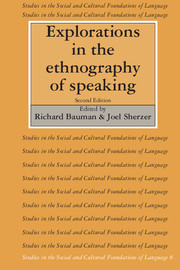Book contents
- Frontmatter
- Contents
- INTRODUCTION TO THE SECOND EDITION
- I PREFACE AND INTRODUCTION
- II COMMUNITIES AND RESOURCES FOR PERFORMANCE
- Introduction
- 1 A Quantitative Paradigm for the Study of Communicative Competence
- 2 Language Identity of the Colombian Vaupés Indians
- 3 ‘Our Ancestors Spoke in Pairs’: Rotinese Views of Language, Dialect, and Code
- III COMMUNITY GROUND RULES FOR PERFORMANCE
- IV SPEECH ACTS, EVENTS, AND SITUATIONS
- V THE SHAPING OF ARTISTIC STRUCTURES IN PERFORMANCE
- VI TOWARD AN ETHNOLOGY OF SPEAKING
- Notes
- References
- Index of names
3 - ‘Our Ancestors Spoke in Pairs’: Rotinese Views of Language, Dialect, and Code
Published online by Cambridge University Press: 05 June 2012
- Frontmatter
- Contents
- INTRODUCTION TO THE SECOND EDITION
- I PREFACE AND INTRODUCTION
- II COMMUNITIES AND RESOURCES FOR PERFORMANCE
- Introduction
- 1 A Quantitative Paradigm for the Study of Communicative Competence
- 2 Language Identity of the Colombian Vaupés Indians
- 3 ‘Our Ancestors Spoke in Pairs’: Rotinese Views of Language, Dialect, and Code
- III COMMUNITY GROUND RULES FOR PERFORMANCE
- IV SPEECH ACTS, EVENTS, AND SITUATIONS
- V THE SHAPING OF ARTISTIC STRUCTURES IN PERFORMANCE
- VI TOWARD AN ETHNOLOGY OF SPEAKING
- Notes
- References
- Index of names
Summary
For a Rotinese, the pleasure of life is talk – not simply an idle chatter that passes time, but the more formal taking of sides in endless dispute, argument, and repartee or the rivaling of one another in eloquent and balanced phrases on ceremonial occasions. Speeches, sermons, and rhetorical statements are a delight. But in this class society, with hierarchies of order, there are notable constraints on speech. In gatherings, nobles speak more than commoners, men more than women, elders more than juniors; yet commoners, women, and youth, when given the opportunity as they invariably are, display the same prodigious verbal prowess. Lack of talk is an indication of distress. Rotinese repeatedly explain that if their ‘hearts’ are confused or dejected, they keep silent. Contrarily, to be involved with someone requires active verbal encounter and this often leads to a form of litigation that is conducted more, it would seem, for the sake of argument than for any possible gain.
Three hundred years of Dutch records for the island provide an apt chronicle of this attitude toward speaking. The Dutch East India Company annual reports for Timor in the eighteenth century are crammed with accounts of the shifting squabbles of related Rotinese rulers. By the twentieth century, the colonial service had informally established Roti as a testing ground. If a young administrator could weather the storms of the litigious Rotinese, he was due for promotion.
- Type
- Chapter
- Information
- Explorations in the Ethnography of Speaking , pp. 65 - 86Publisher: Cambridge University PressPrint publication year: 1989
- 4
- Cited by



